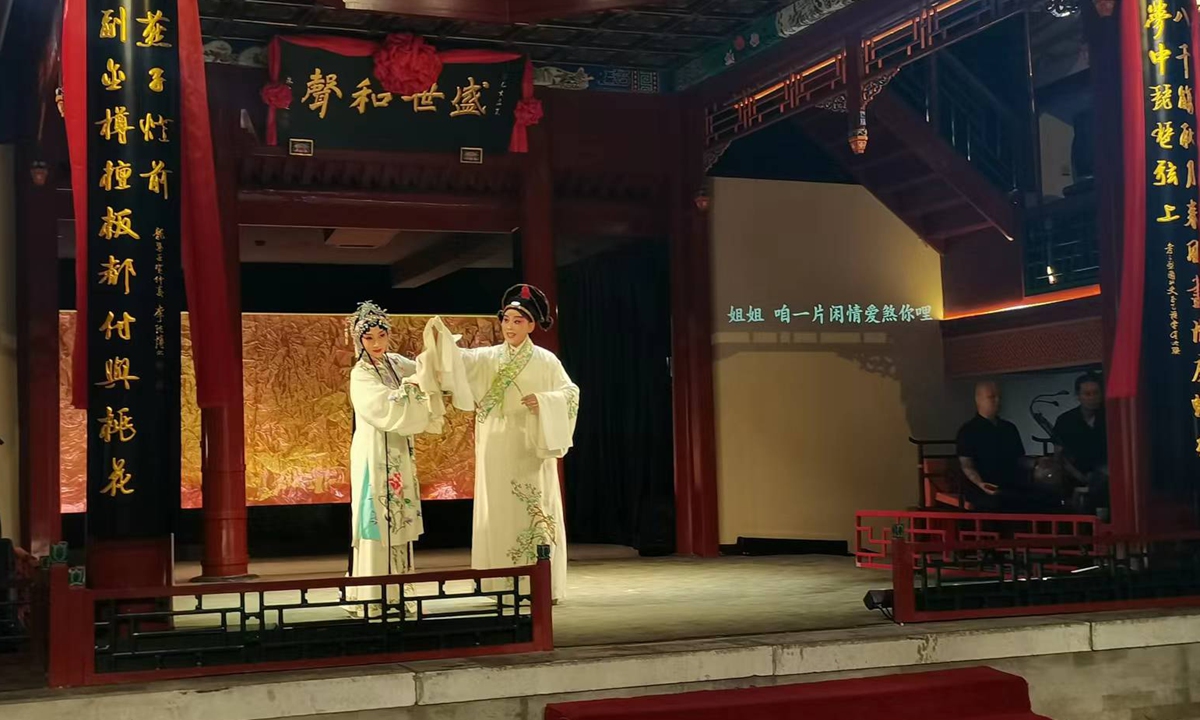ARTS / ART
600-year-old Kunqu Opera makes long-term partnership with world's leading art gala Edinburgh Festival Fringe

Kunqu performers at the event Photo:Courtesy of the event
Kunqu Opera, China's 600-year-old intangible cultural heritage, is set to appear at one of the world's most celebrated art festivals - the Fringe - in Edinburgh, the UK, following the signing of a China-UK strategic cultural promotion agreement between the Asian Art Fund of Scotland and the Northern Kunqu Opera Theatre based in Beijing on Monday.
During the 2022 Fringe, Kunqu Opera culture will be presented in online performances showcased at the Edinburgh venue. The China-UK cooperation marks Kunqu Opera's first long-term participation in the annual European art festival that attracts more than 250,000 visitors every year.
"The online show this year is just a beginning. We will have more offline events held in the future in Edinburgh, and there will be interactions between Chinese and European artists concerning this Asian art," Chris Wang, the Edinburgh Kunqu Opera marketing representative, told the Global Times on Monday.
The new cultural scheme aims to launch a global festival themed "Rediscovery of Kunqu" by 2024. Additionally, Kunqu classes will be held in Europe and an Edinburgh Kunqu Opera Promotional Center will be built in Beijing.
The 2022 Fringe will not be the first time that the Chinese art has been celebrated in the Western world.
In 2016, the China-UK co-directed Kunqu Opera Handan Dream debuted in London to commemorate the 400th anniversary of William Shakespeare and Tang Xianzu, the Ming Dynasty (1368-1644) Chinese playwright dubbed the "Asian Shakespeare." That same year, a Kunqu Opera version of Hamlet titled I, Hamlet was performed at an art festival in London. The show was later presented in Shanghai and New York.
"Kunqu Opera appeals to Western audiences because it is an epitome of many Chinese art forms such as literature, dance and poetry," Yang Fengyi, art director of the Northern Kunqu Opera Theatre, told the Global Times on Tuesday.
"The reason we seek cultural exchanges with Western artists is not to give them the Chinese script, but to have them bring their cultural interpretation and expression to the Kunqu performance so that they can tell the Chinese story behind the script," Yang noted.
Yang recalled her unforgettable experience in 2018, when she performed the Kunqu Opera version of Russia's Yakut Heroic Epos Olonkho in cities such as St. Petersburg and Moscow. This performance surprised and touched many Russian audiences.
She also noted that in return Russian Kunqu lovers performed the classic The Peony Pavilion by Tang Xianzu.
"When I saw them come out with a little boat I was touched. The ambience and their interpretations of the art of Kunqu Opera allowed me to see its cultural significance even better."
Originating in Kunshan, East China's Jiangsu Province, Kunqu Opera has been praised as "the origin of all Chinese Operas." It was listed as one of the Masterpieces of the Oral and Intangible Cultural Heritage of Humanity by UNESCO in 2001.
Though the art form first started to dominate Chinese theater from the 16th to the 18th centuries, it is still inspiring to today's audiences, especially attracting younger audiences due to their increased confidence in Chinese culture.
"In the past, young people longed for the Western culture, but now that China has increased international discourse power, young audiences are starting to appreciate their Chinese roots even more. This gives us the opportunity to promote traditional Kunqu Opera with more creative means," Yang noted.
Going abroad is not the only creative means to promote Kunqu Opera. In fact, many Kunqu performances today have been adding elements like violin and bass into the music and designing more contemporary-looking costumes to cater to younger audiences. Theaters like the Northern Kunqu Opera Theatre have also launched livestreaming of Kunqu Opera performances to attract audiences online.
"Old people listen to Kunqu Opera, but young people also watch it. We need to give them some new experiences," Yang remarked.
Li Lingxiao contributed to this article.
